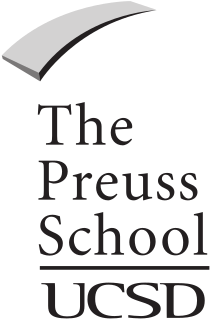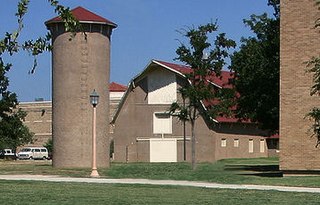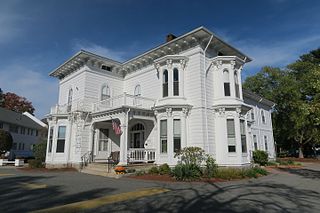
A community college is a type of educational institution. The term can have different meanings in different countries: many community colleges have an "open enrollment" for students who have graduated from high school. The term usually refers to a higher educational institution that provides workforce education and college transfer academic programs. Some institutions maintain athletic teams and dormitories similar to their university counterparts.

A teaching assistant or teacher's aide (TA) or education assistant (EA) or team teacher (TT) is an individual who assists a teacher with instructional responsibilities. TAs include graduate teaching assistants (GTAs), who are graduate students; undergraduate teaching assistants (UTAs), who are undergraduate students; secondary school TAs, who are either high school students or adults; and elementary school TAs, who are adults.

Student affairs, student support, or student services is the department or division of services and support for student success at institutions of higher education to enhance student growth and development. People who work in this field are known as student affairs practitioners or student affairs professionals. These student affairs practitioners work to provide services and support for students and drive student learning outside of the classroom at institutions of higher education.

The Preuss School, Preuss School UCSD, or Preuss Model School is a coeducational college-preparatory charter day school established on a $14 million campus situated on the University of California San Diego (UCSD) campus in La Jolla, California, United States. The school was named in recognition of a gift from the Preuss Family Foundation and is chartered under the San Diego Unified School District (SDUSD).

Agricultural education is the teaching of agriculture, natural resources, and land management. At higher levels, agricultural education is primarily undertaken to prepare students for employment in the agricultural sector. Classes taught in an agricultural education curriculum may include horticulture, land management, turf grass management, agricultural science, small animal care, machine and shop classes, health and nutrition, livestock management, and biology.

Freedom High School is located in Orlando, Florida. It is one of twenty public high schools in Orange County. The school was established in 2003 in order to relieve crowding at nearby Cypress Creek High School; like other relief high schools, they share a rivalry. It is a rivalry dubbed as the South Orange Classic. Freedom's feeder schools are Freedom Middle School, Hunter's Creek Middle School and West Ridge Middle School in Oak Ridge. The current principal is Mrs. Cheryl Neely Mir. It has nearly identical campus layouts as Olympia High School and Timber Creek High School. Lake Brantley High School in neighboring Seminole County has similar colors and nickname.

The Learning Center for the Deaf (TLC) is a Framingham, Massachusetts-based non-profit organization and school serving deaf and hard-of-hearing children and adults.

South San Francisco High School is a 9-12 public high school in South San Francisco, California, United States and is part of the South San Francisco Unified School District (SSFUSD).

The San Diego Community College District (SDCCD) is a public community college district in San Diego, California. The SDCCD is one of the five community college districts in San Diego County and part of the California Community Colleges system. Under the California Master Plan for Higher Education, the California Community Colleges system is a part of the state's three-tier public higher education system, which also includes the University of California system and California State University system.
The educational system in California consists of public, NPS, and private schools in the U.S. state of California, including the public University of California, California State University, and California Community Colleges systems, private colleges and universities, and public and private elementary, middle, and high schools.

Sequoia High School is a high school in downtown Redwood City, California, United States. Today, it is one of the few schools to offer the International Baccalaureate (IB) Diploma Programme within the San Francisco Bay Area.

Higher education in Alberta refers to the post secondary education system for the province of Alberta. The Ministry of Advanced Education in Alberta oversees educational delivery through universities, publicly funded colleges, technical institutions, and private colleges. These institutions offer a variety of academic and vocational pursuits. Students have access to post-secondary options through most regions of Alberta, and a developed articulation system allows for increased student mobility.
In the United States, community colleges are primarily two-year public institutions of tertiary education. Community colleges also offer remedial education, GEDs, high school diplomas, technical degrees and certificates, and a limited number of 4-year degrees. After graduating from a community college, some students transfer to a four-year college or university to continue their studies. Community college is tuition free for selected students in 47 states, often under the name College Promise. Most community college instructors have advanced degrees, but serve as part-time low wage employees.
Gaining Early Awareness and Readiness for Undergraduate Programs is a federal grant program administered by the United States Department of Education. It was established in Chapter 2 of the 1998 amendments to the Higher Education Act of 1965 which awarded financial assistance to students and colleges from the federal government. GEAR UP was authored by Congressman Chaka Fattah and signed into law by President Bill Clinton in October, 1998.

Golden Link College is an institution established by the Theosophical Society in the Philippines and the Theosophical Order of Service Foundation Philippines. It is located in the northern part of Caloocan, Philippines. As of 2009, it offers courses from preschool, elementary, secondary up to collegiate levels. It is a non-profit, non-sectarian college set up as foundation.
The Rhode Island Department of Education (RIDE) is a state agency in Rhode Island that oversees the elementary and secondary education system from pre-Kindergarten through high school. It is headquartered in Providence. RIDE works closely with the Rhode Island Office of the Postsecondary Commissioner (RIOPC), the agency charged with overseeing higher education. Together, RIDE and RIOPC aim to provide an aligned, cohesive, and comprehensive education for all students.

National University (NU) is a private university with its headquarters in San Diego, California. Founded in 1971, National University offers academic degree programs at campuses throughout California, a satellite campus in Nevada, and various programs online. Programs at National University are designed for adult learners. On-campus classes are typically blended learning courses, concentrated to four weeks or on weeknights with occasional Saturday classes. The university uses asynchronous learning and real-time virtual classrooms for its online programs.
The Akron Digital Academy was a public, community school district serving students in Akron, Ohio, United States and its surrounding counties. Akron Digital is located in the northeastern part of Ohio, 40 miles south of Cleveland and 20 miles north of Canton. The district includes two high schools and one middle school. There are approximately 500 students enrolled in blended learning school.
ACT, Inc. is an American 501(c)(3) nonprofit organization, primarily known for the ACT, a standardized test designed to assess high school students' academic achievement and college readiness. For the U.S. high school graduating class of 2019, 52 percent of graduates had taken the ACT test; the more than 1.78 million students included virtually all high school graduates in 17 states.
Educational interventions for first-generation college students (FGCS) are programs intended to provide resources and make education more attainable and desirable for FGCS and their families. A study by Alex Casillas has identified that "FGCS […] face greater pressure not to go to college, either because of a lack of role models or because of pressure to contribute to their family's financial needs." Many interventions are being explored to lower and/or remove the fears and struggles FGCS face regarding their education. These interventions are intended to bridge the gap between FGCS and their educational experience by providing them with the access to information and resources their non-first-generation peers already have. This article discusses several programs currently being implemented, including AVID, GEAR-UP, and after-school programs, in addition to non-profit college access programs and privately funded organizations that work to address access to higher education for underprivileged and first-generation students. There is also critical discussion regarding the pedagogical role of these educational interventions in building a sense of value and belonging in its students.












